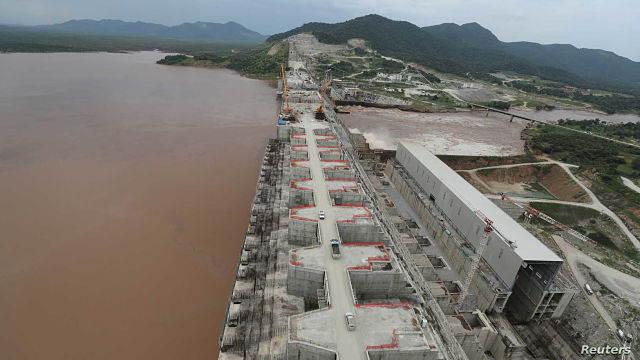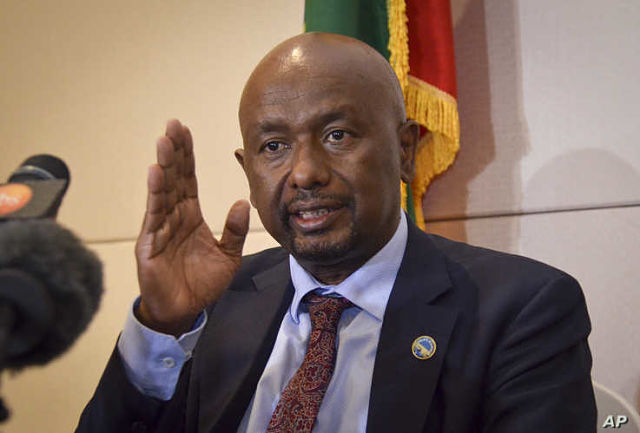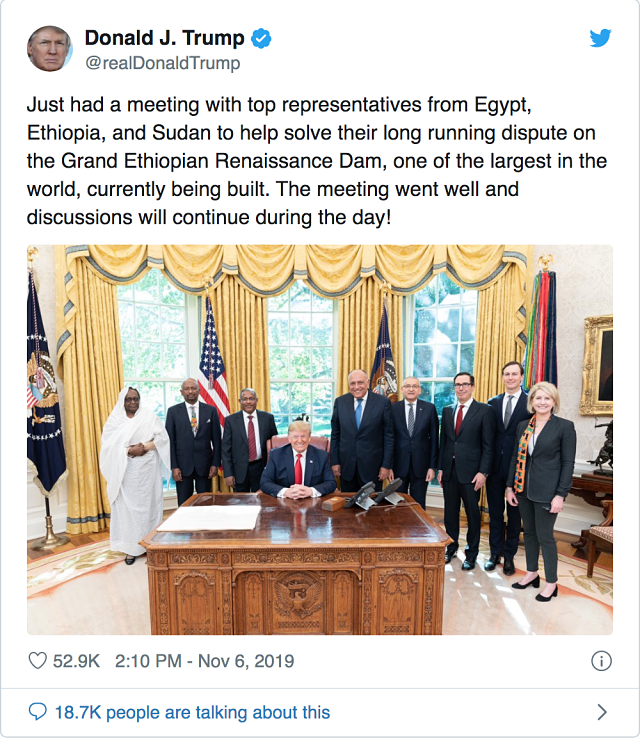 Ethiopia's Grand Renaissance Dam is seen as it undergoes construction work on the river Nile in Guba Woreda, Benishangul Gumuz Region, Ethiopia September 26, 2019. Picture taken September 26, 2019. REUTERS/Tiksa Negeri
Ethiopia's Grand Renaissance Dam is seen as it undergoes construction work on the river Nile in Guba Woreda, Benishangul Gumuz Region, Ethiopia September 26, 2019. Picture taken September 26, 2019. REUTERS/Tiksa Negeri
VOA
US-Brokered Nile Dam Deal Still Deadlocked
WASHINGTON – The latest round of talks between Egypt, Ethiopia and Sudan in Washington has failed to reach a comprehensive agreement on the Grand Ethiopia Renaissance Dam (GERD), a massive hydropower project on Ethiopia’s Blue Nile River.
The White House released a statement saying President Trump spoke with Ethiopian Prime Minister Abiy Ahmed on Friday, and “expressed optimism” that a deal was close.
The tripartite meeting hosted by the U.S. Treasury is the parties’ last-ditch attempt to resolve the question of the operation of the dam, particularly the filling of its reservoir, an issue that has triggered concerns of a “water war” between Egypt and Ethiopia.
The meeting was scheduled to end Wednesday but continued until Friday without an agreement on filling the reservoir.
The U.S. Treasury released a statement Friday that the parties will continue to work on the legal and technical aspects of the agreement for a signing by the end of February. The agreement would include a schedule for a stage-based filling plan of the reservoir, and a mitigation mechanism for filling and operations during periods of drought and prolonged drought.
Ethiopia and Egypt have been negotiating for years, but several technical sticking points remain, including the duration and rate at which Ethiopia will draw water out of the Nile and the quantity of water that will be retained. Cairo fears Ethiopia’s plans to rapidly fill the reservoir could threaten Egypt’s source of fresh water.
The technical details of how, when, and where the water will flow are a life-and-death matter for each party,” said Bronwyn Bruton, deputy director of the Atlantic Council’s Africa Center. Bruton added that the situation is complicated by “international organizations and mediating third party countries, which all come with their own interests and agendas.”
With the Trump administration’s urging, last November the parties agreed to hold four technical governmental meetings at the level of water ministers with the World Bank and the United States attending as observers. They agreed to a deadline of January 15, 2020, for reaching an accord. When they failed to reach an agreement, the parties agreed to another round of talks this week.
The main issue has been a lack of consensus, said Mirette Mabrouk, director of the Egypt Program at the Middle East Institute. “Ethiopia’s priority has been to complete the dam and Egypt’s priority has been to ensure that its near sole source of water is not decimated,” Mabrouk said.
A flexible treaty
In previous statements, the ministers have recognized that flexibility in trans-boundary water management is essential considering the constantly changing levels of the Nile.
They have agreed that guidelines for the filling and operation of the GERD “may be adjusted by the three countries, in accordance with the hydrological conditions in the given year.”
However, competing hydrological and political interests have hindered negotiations.
The director of the Water Institute at the University of North Carolina, Aaron Salzberg said that parties are striving for an agreement that is “easily codified in terms of numbers” –how fast you can fill, how much water is released.” At the same time, he says, the agreement must establish a joint decision-making process that allows flexibility in responding to changing conditions, but not one that may be “too open to interpretation and set the stage for conflict down the line.”
This is not something that should be forced, Salzberg added. “The parties themselves must drive the process. This is an agreement that will need to last multiple lifetimes,” he said.

Sileshi Bekele, Ethiopia’s Minister for Water and Energy, speaks to the media after the end of the fourth and final round of talks between Ethiopia, Egypt and Sudan on Ethiopia’s construction of a controversial dam on the Nile River, in Addis Ababa, Thursday, Jan. 9, 2020. (AP Photo)
Mediation?
On their first Washington meeting on November 6, the foreign ministers agreed that if a deal is not reached by January 15, 2020, Article 10 of the 2015 Declaration of Principles will be invoked.
Article 10 of the declaration, signed in Khartoum, addresses the peaceful settlement of disputes. It states that “if the parties involved do not succeed in solving the dispute through talks or negotiations, they can ask for mediation or refer the matter to their heads of states or prime ministers.”
Egypt has long-sought external mediation, while Ethiopia wants to keep the negotiations on a tripartite level. But earlier this month Ethiopian Prime Minister Ahmed said he has asked South African President Cyril Ramaphosa to intervene. Ramaphosa has accepted the task.
Under the 1959 Nile Waters Agreement between Egypt and Sudan, signed before Egypt began constructing the Aswan High Dam, Egypt can take up to 55.5 billion cubic meters of water from the Nile each year, and Sudan can take up to 18.5 billion. Ethiopia was not part of that agreement.
US involvement
U.S. involvement in the dam issue came about after Egyptian President Abdel-Fattah el-Sisi last year requested that President Trump help mediate the conflict. A senior Trump administration official confirmed that the president had offered “the good offices of Mnuchin” to lead the effort and the U.S. Treasury Secretary Steve Mnuchin has played the role of host and observer in negotiations since last November.
Trump appears to have sustained his interest on the negotiations and has even gone so far as inviting the ministers to impromptu meetings at the Oval Office on November 6 and January 14.
After the last meeting, the White House released a statement that Trump emphasized to the foreign and water resources ministers of Egypt, Ethiopia, and Sudan that the United States “wants to see all of these countries thrive and expressed hope that each country will take this opportunity to work together so that future generations may succeed and benefit from critical water resources.”
—
Join the conversation on Twitter and Facebook.


























